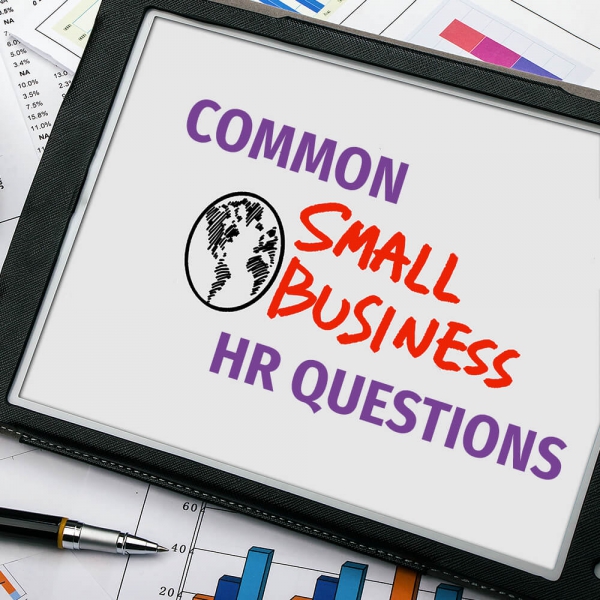
As a business owner, you answer questions and make decisions every day that impacts the success of your company. You might have a good grasp of what vendors to use or how to manage your team. You've asked yourself these important business questions before and have found your answers.
But when it comes to HR, odds are you are being asked questions you've never heard or even considered.
In a business world of compliance and regulations, making the wrong decision can be damaging.
Our team at AlignHR has over 100 years of combined human resource expertise. Although new questions come up every day (example: COVID, remote working, vaccination policies), we've probably answered 99% of the questions you are hearing for the first time.
Whether you are a brand new business owner or are a savvy entrepreneur, we have you covered. Let's look at some of the most common small business HR questions.
Yes, we've all asked it.
Terminating an employee can be challenging - especially when it's based on poor performance.
If you have well-documented policies and procedures, the process of terminating an employee based on a code of conduct can be relatively straightforward. This is when you really thank yourself for putting together an employee handbook.
Many small businesses end up hiring individuals in their community. Sometimes the lines blur between employee and friend. When the employee's performance is suffering and there is no course of correction, you put yourself in a very difficult position.
Although every situation and company handles terminating employees slightly differently, there are some common legalities you must follow in order to avoid lawsuits or potential PR issues. USChamber.com outlines five legal steps to fire an employee:
These legal requirements can help you get through the process, but sometimes you would rather distance yourself from the process. This is when having an HR partner can help guide or navigate the necessary steps.
You might think a harmless interview question is not a big deal, but it can land you in a lot of trouble.
If you are a small business owner that likes to interview all of your potential employees, it's important to understand what you can ask and more importantly what you can't ask.
The U.S. Equal Employment Opportunity Commission (EEOC) has strict laws in place to protect job candidates and employees from discrimination. For this reason, you shouldn't ask questions regarding age, disability, race, gender identity, sexual orientation, religion, national origin, or marital status.
You might think asking a simple question about an applicant's children is okay, but this can be deemed discriminatory. You can find a list and additional details about discrimination types at eeoc.gov.
The Hartford does a great job detailing 8 Illegal Interview Questions to avoid.
"An hour of planning can save you 10 hours of doing" Dale Carnegie
Regardless of the size of the business, having a plan and structure in place saves time and energy in the future.
There are a lot of trade businesses that startup as a single owner and grow larger than they expected. Over time they hire employees to help out and soon they find themselves surrounded by a team. Every day they are asked the same questions by different employees.
Not only does the business owner have to take time to answer these questions, but they also run the risk of giving different answers to different employees.
It is a myth that small businesses do not need an employee handbook.
An employee handbook is a valuable tool for communicating policies and regulations. Handbooks set expectations for performance, conduct, and also satisfy any regulatory requirements.
SHRM.org provides some resources on how to develop an employee handbook.
It's never too late to start the process.
You probably dislike taxes like the rest of us. As a business owner, you get an added frustration over taxes.
Sure, you might have QuickBooks set up and you've figured out how to add taxes to your invoice - but now what?
Unfortunately, the websites from region to region are confusing and full of jargon that seems foreign to most individuals without an accounting background.
It's fairly obvious why having someone on your team that understands taxes and payroll is a big help.
This sounds a bit odd, but it's a fair question.
You would think that posting a job with the hourly rate would help you determine how much a job is worth. There are salary calculators available online but the bigger question is often how much of your revenue should be put toward employee salaries.
NerdWallet.com says a good rule of thumb is to put 40%-80% of your business revenue toward payroll.
There are rules and regulations regarding pay. Companies need to know and understand the Fair Labor Standards Act (FLSA), along with a variety of other employee complexities.
Part of operating a successful business is planning accordingly (knowing how much you can pay) and limiting risks (compliance).
AlignHR was founded based on the desire to take Human Resources to a new level, focusing specifically on how HR integrates operationally within all aspects of an organization/company.
Our team of experts and HR specialists works with business owners, CEOs, CFOs, Controllers, Office Managers, Payroll Administrators, and other team members responsible for the HR function.
If you have a question regarding HR compliance, structure/process, technology or strategy, contact us today.
We look forward to talking with you.